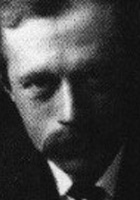Arthur Symons
Arthur Symons Poems
I have loved colours, and not flowers;
Their motion, not the swallows wings;
And wasted more than half my hours
Without the comradeship of things.
...
As a perfume doth remain
In the folds where it hath lain,
So the thought of you, remaining
Deeply folded in my brain,
...
My life is like a music-hall,
Where, in the impotence of rage,
Chained by enchantment to my stall,
I see myself upon the stage
...
I have laid sorrow to sleep;
Love sleeps.
She who oft made me weep
Now weeps.
...
Sweet, can I sing you the song of your kisses?
How soft is this one, how subtle this is,
How fluttering swift as a bird's kiss that is,
As a bird that taps at a leafy lattice;
...
Emmy's exquisite youth and her virginal air,
Eyes and teeth in the flash of a musical smile,
Come to me out of the past, and I see her there
As I saw her once for a while.
...
I broider the world upon a loom,
I broider with dreams my tapestry;
Here in a little lonely room
I am master of earth and sea,
...
They pass upon their old, tremulous feet,
Creeping with little satchels down the street,
And they remember, many years ago,
Passing that way in silks. They wander, slow
...
It was a day of sun and rain,
Uncertain as a child's swift moods;
And I shall never spend again
So blithe a day among the woods.
...
The fountain murmuring of sleep,
A drowsy tune;
The flickering green of leaves that keep
The light of June;
...
Twitched strings, the clang of metal, beaten drums,
Dull, shrill, continuous, disquieting:
And now the stealthy dancer comes
Undulantly with cat-like steps that cling;
...
The wind is rising on the sea,
The windy white foam-dancers leap;
And the sea moans uneasily,
And turns to sleep, and cannot sleep.
...
The gipsy tents are on the down,
The gipsy girls are here;
And it's O to be off and away from the town
With a gipsy for my dear!
...
That day a fire was in my blood;
I could have sung: joy wrapt me round;
The men I met seemed all so good,
I scarcely knew I trod the ground.
...
As a perfume doth remain
In the folds where it hath lain,
So the thought of you, remaining
...
Miraculous silver-work in stone
Against the blue miraculous skies,
The belfry towers and turrets rise
Out of the arches that enthrone
...
O water, voice of my heart, crying in the sand,
All night long crying with a mournful cry,
As I lie and listen, and cannot understand
...
The light of our cigarettes
Went and came in the gloom:
It was dark in the little room.
...
I heard the sighing of the reed
In the grey pool in the green land,
The sea-wind in the long reeds sighing
Between the green hill and the sand.
...
The pale moon shining from a pallid sky
Lit half the street, and over half she laid
Her folded mantle; through the dark-browed shade
White windows glittered, each a watchful eye.
...
Arthur Symons Biography
Arthur William Symons, was a British poet, critic and magazine editor. Life Born in Milford Haven, Wales, of Cornish parents, Symons was educated privately, spending much of his time in France and Italy. In 1884–1886 he edited four of Bernard Quaritch's Shakespeare's Quarto Facsimiles, and in 1888–1889 seven plays of the "Henry Irving" Shakespeare. He became a member of the staff of the Athenaeum in 1891, and of the Saturday Review in 1894, but his major editorial feat was his work with the short-lived Savoy. His first volume of verse, Days and Nights (1889), consisted of dramatic monologues. His later verse is influenced by a close study of modern French writers, of Charles Baudelaire, and especially of Paul Verlaine. He reflects French tendencies both in the subject-matter and style of his poems, in their eroticism and their vividness of description. Symons contributed poems and essays to the Yellow Book, including an important piece which was later expanded into The Symbolist Movement in Literature, which would have a major influence on William Butler Yeats and T.S. Eliot. From late 1895 through 1896 he edited, along with Aubrey Beardsley and Leonard Smithers, The Savoy, a literary magazine which published both art and literature. Noteworthy contributors included Yeats, George Bernard Shaw, and Joseph Conrad. In 1892, The Minister's Call, Symons's first play, was produced by the Independent Theatre Society – a private club – to avoid censorship by the Lord Chamberlain's Office. In 1902 Symons made a selection from his earlier verse, published as Poems. He translated from the Italian of Gabriele D'Annunzio The Dead City (1900) and The Child of Pleasure (1898), and from the French of Émile Verhaeren The Dawn (1898). To The Poems of Ernest Dowson(1905) he prefixed an essay on the deceased poet, who was a kind of English Verlaine and had many attractions for Symons. In 1909 Symons suffered a psychotic breakdown, and published very little new work for a period of more than twenty years. His Confessions: A Study in Pathology (1930), has a moving description of his breakdown and treatment.)
The Best Poem Of Arthur Symons
Amends To Nature
I have loved colours, and not flowers;
Their motion, not the swallows wings;
And wasted more than half my hours
Without the comradeship of things.
How is it, now, that I can see,
With love and wonder and delight,
The children of the hedge and tree,
The little lords of day and night?
How is it that I see the roads,
No longer with usurping eyes,
A twilight meeting-place for toads,
A mid-day mart for butterflies?
I feel, in every midge that hums,
Life, fugitive and infinite,
And suddenly the world becomes
A part of me and I of it.
